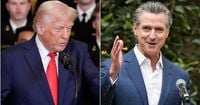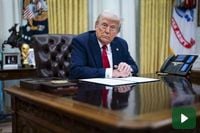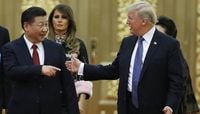The ongoing trade war initiated by former President Donald Trump is intensifying, as evidenced by recent developments that have sent shockwaves through global markets and diplomatic relations. The situation escalated further when Trump rejected a European Union proposal to suspend reciprocal tariffs on industrial goods, including automobiles, while simultaneously announcing a review of tariffs on essential minerals. This rejection has raised concerns about the future of transatlantic trade and the potential ramifications for the global economy.
In a striking move, California Governor Gavin Newsom announced a lawsuit against Trump, accusing him of abusing emergency powers to impose global tariffs that have adversely affected the Californian economy. The lawsuit, filed on April 16, 2025, challenges the legality of tariffs imposed during Trump's administration on countries such as Mexico, China, and Canada, as well as a base tariff of 10% on all imports from the rest of the world. Newsom's office stated that these measures were enacted without the necessary congressional approval, violating constitutional limits on presidential authority. "Trump's illegal tariffs are wreaking havoc on families, businesses, and the California economy," Newsom declared. "Prices are rising, jobs are at risk, and we cannot allow this chaos to continue harming people."
The World Trade Organization (WTO) has also revised its global trade forecasts for 2025, indicating a potential decline in international trade volumes by 0.2% to 1.5% due to escalating trade tensions and protectionist policies. The WTO's concerns are primarily focused on the tit-for-tat tariff policies between the United States and China, where Washington has imposed tariffs as high as 145% on certain Chinese products. In response, China has expressed its willingness to engage in talks with the U.S. but has set preliminary conditions, including a halt to derogatory comments from U.S. officials and a more consistent American stance on sanctions and issues related to Taiwan.
Meanwhile, the economic fallout from these trade policies is becoming increasingly apparent. Wall Street has reacted negatively, with the Dow Jones Industrial Average dropping 1.73% and the Nasdaq falling 3.04%. The declines were exacerbated by new U.S. restrictions on chip exports to China, which significantly impacted technology companies like Nvidia and AMD, leading to substantial stock price drops. Nvidia saw a staggering 7% decline as the company announced it would need to set aside up to $5.5 billion to mitigate the impact of these restrictions.
In the midst of this turmoil, Trump has maintained a defiant stance, insisting that the U.S. is benefiting from the tariffs. During an interview with Fox Noticias, he claimed, "With tariffs, we're collecting hundreds of billions of dollars after many decades of being robbed. It's time to stop allowing it." He further asserted that inflation is decreasing as a result of these tariffs, stating, "Promises made, promises kept!" However, former President Joe Biden criticized the current administration, stating, "In 100 days, this new administration has caused so much damage and destruction. It's almost shocking to think it could happen so quickly."
As the situation continues to unfold, the international community watches closely. Premier Giorgia Meloni of Italy arrived in Washington for a bilateral meeting with Trump, emphasizing the need for clarity and pragmatism in these complex negotiations. Meloni stated, "We will do our best; I am aware of what I represent and what I am defending." She also coordinated with European Commission President Ursula von der Leyen ahead of her visit, highlighting the importance of a unified European approach to the ongoing trade discussions.
The implications of Trump's tariff policies are far-reaching, with estimates suggesting that Germany could face losses of approximately 290 billion euros by 2028 due to the trade war. The overall costs for the European Union are projected to reach 1.1 trillion euros over four years, exacerbating economic uncertainties across the continent. Economists warn that the escalating trade war could lead to a significant slowdown in global economic growth, with Fitch Ratings recently downgrading its growth forecasts for both the U.S. and China.
In response to the mounting pressures, the automotive industry is also feeling the heat. Japanese automaker Honda announced plans to relocate production of its hybrid Civic model from Japan to Indiana, USA, to mitigate the impact of U.S. tariffs on Japanese exports. This move highlights the shifting dynamics of global supply chains as companies adapt to the changing trade landscape.
As the trade war rages on, the stakes are high for all parties involved. The potential for a global economic downturn looms large as countries grapple with the consequences of protectionist policies. The WTO's warning about declining trade volumes serves as a stark reminder of the fragility of the current economic climate.
In a broader context, the trade dispute between the U.S. and China reflects a deeper ideological conflict over technology, supply chains, and global influence. Washington's strategy appears to be aimed at isolating China economically and politically, with Secretary of the Treasury Scott Bessent reportedly discussing these tactics directly with Trump. The U.S. is leveraging its position to pressure partners to limit their economic ties with China, indicating a shift in the global economic landscape.
As the world watches the unfolding events, the question remains: can diplomacy prevail over confrontation? The upcoming negotiations between the U.S. and its allies, including Meloni's discussions with Trump, will be crucial in determining the future of international trade relations. With both sides entrenched in their positions, finding common ground will be essential to avoid further escalation.
In conclusion, the trade war initiated by Trump is not just a battle over tariffs but a complex interplay of economic, political, and ideological factors that could reshape global trade for years to come. As countries navigate these turbulent waters, the hope is for a resolution that prioritizes cooperation over conflict, ensuring a stable and prosperous economic future for all.








